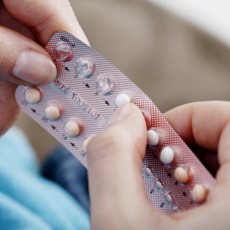
IMG via MedlinePlus
Women take birth control for a multitude of reasons, from preventing pregnancy to regulating the menstrual cycle and reducing acne. Taken correctly, the pill can prevent 99% of pregnancies. This has made birth control a staple for generations of women. However, some women may wonder, What happens if I stop taking the pill? One misconception about the pill is that taken for years, it can reduce the ability to have children. The possibility of future infertility would deter many women from considering birth control pills. So, let’s think twice about it.
The combination pill works by supplying two hormones, estrogen and progesterone, that work together to stop the ovaries from releasing an egg each month during menstruation. Other pills provide only progesterone; progestin-only pills prevent pregnancy primarily by thickening the cervical mucus. When you stop taking the pill, the hormones it supplies leave your system in a matter of days, and your body reverts to its natural cycle. Additionally, your body begins to produce estrogen and progesterone again. Therefore, barring underlying health issues, women can become pregnant right away after stopping the pill.
There are several reasons behind the misconception that birth control causes infertility. One is that taking birth control can conceal symptoms of conditions associated with infertility, such as endometriosis, PCOS, and uterine fibroids. Birth control is sometimes used to manage these conditions, so stopping birth control might mistakenly associated with infertility. Another reason for this misconception might be that historically, the side effects of the pill were not well-researched or disclosed to users, so it was not clear whether infertility was a risk. Women often felt dismissed by clinicians and pharmaceutical companies when they experienced side effects of the pill, even for conditions as serious as blood clots and strokes. In the 1960s, despite reports of deaths related to the pill, the FDA maintained that the pill was safe. Additionally, drug companies failed to inform healthcare providers of the pill’s more severe side effects. Since then, the dosage of hormones provided by the pill was adjusted to improve its safety, but mistrust of the pill persists and worries about infertility have continued to the present day.
However, there is good evidence that birth control users need not worry about their fertility. A 2018 review of twenty-two birth control studies including over 14,000 women showed that 83% of women became pregnant within 12 months of discontinuing contraception. Furthermore, a 2013 study of 3,727 women found that although birth control use was associated with a short delay before conception, overall fertility was not impacted. Additionally, longer-term use of the pill was associated with higher fertility compared to short-term use (less than 2 years). Therefore, even long-term users of the pill should not be concerned. Overall, the evidence suggests that worries about infertility should not stop women from taking the pill.
Links:
https://my.clevelandclinic.org/health/drugs/3977-birth-control-the-pill
https://health.clevelandclinic.org/can-birth-control-make-you-infertile/
https://www.ncbi.nlm.nih.gov/pmc/articles/PMC6055351/
https://health.clevelandclinic.org/6-things-that-can-happen-when-you-stop-taking-the-pill/
https://www.healthline.com/health/birth-control/can-birth-control-cause-infertility#misconceptions
https://www.sciencedirect.com/science/article/pii/S0277953621005797#bib115

